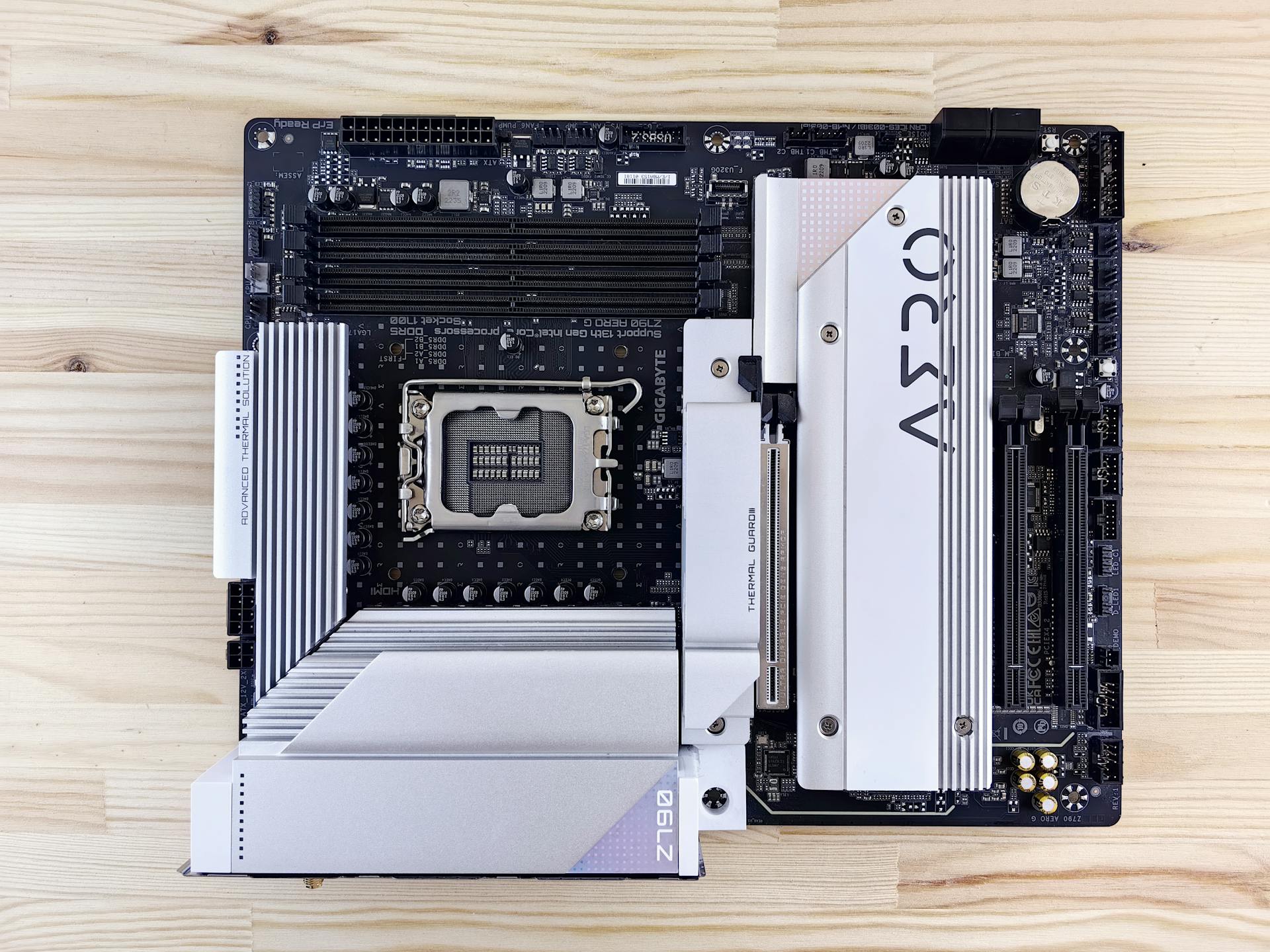
The Department of Computer Science at McGill University is a world-renowned program that offers a wide range of courses and curriculum options to its students.
The undergraduate program in Computer Science at McGill is a four-year Bachelor of Science (BSc) degree that allows students to specialize in areas like artificial intelligence, data science, and software engineering.
Students in the program can choose from a variety of courses, including Data Structures and Algorithms, Computer Systems, and Computer Vision.
The program's curriculum is designed to provide students with a strong foundation in computer science principles and a broad range of skills to prepare them for a variety of career paths.
Graduates of the program have gone on to work at top tech companies like Google, Facebook, and Microsoft, as well as start their own successful tech ventures.
Readers also liked: Georgia Tech Comp Sci Ranking
Admissions and Requirements
To pursue a program in Computer Science at McGill University, you'll need to meet the admission requirements set by the university.
You'll need to have a reasonable mathematical background, which means completing MATH 140 (or MATH 150), MATH 141 (or MATH 151), and MATH 133, or their CEGEP equivalents, with an average of B- or higher.
English language proficiency is also required, and the specific scores vary by program: for BSc Computer Science, you'll need an IELTS score of 6.5 or a TOEFL iBT score of 90 with no components less than 21.
Here's an interesting read: Comp Sci Math
Admission Requirements
To pursue a program in Computer Science from McGill University, you must meet the admission requirements set by the university.
The first step is to get ready to apply, as mentioned in the university's general step-by-step guide for applying to UG, PG, and PhD programs.
To be eligible for admission, you'll need to meet the English language requirements, which vary depending on the program you're applying for.
Here's a breakdown of the English language requirements for Computer Science programs at McGill University:
Having a reasonable mathematical background is also a requirement for admission to Computer Science or Software Engineering programs. You'll need to have completed specific mathematics courses, such as MATH 140, MATH 141, and MATH 133, or their CEGEP equivalents, with an average grade of B- or higher.
Program Requirements
The program requirements for the School of Computer Science at McGill University are quite straightforward. You can earn a Major program by completing the required courses, which total 33 credits.
The required courses include COMP 202 Foundations of Programming, COMP 206 Introduction to Software Systems, and several others. Here's a list of the required courses:
- COMP 202 Foundations of Programming (3 credits)
- COMP 206 Introduction to Software Systems (3 credits)
- COMP 250 Introduction to Computer Science (3 credits)
- COMP 251 Algorithms and Data Structures (3 credits)
- COMP 273 Introduction to Computer Systems (3 credits)
- COMP 302 Programming Languages and Paradigms (3 credits)
- COMP 303 Software Design (3 credits)
- COMP 310 Operating Systems (3 credits)
- MATH 222 Calculus 3 (3 credits)
- MATH 223 Linear Algebra (3 credits)
- MATH 240 Discrete Structures (3 credits)
You can choose to earn a minimum of 60 credits or a maximum of 63 credits, depending on whether or not you are excused from COMP 202.
Major in Physics
If you're interested in pursuing a Major in Physics, you'll want to check out the related information on the Physics (PHYS) page.
To get started, you can explore the Physics (PHYS) page for more details.
Honours students who choose to major in Physics will need to consult with an Honours advisor in both the Physics and Computer Science departments.
See what others are reading: Comp Sci Requirements
Courses and Curriculum
McGill's Computer Science programs are designed to be flexible and comprehensive, with a range of courses to suit different interests and goals.
The Bachelor of Science (BSc) and Bachelor of Arts and Science (BA and SC) programs both take four years to complete, providing a solid foundation in Computer Science fundamentals.
You can choose from a variety of programs, including the MSc Computer Science, which can be completed in 1.5 to 2 years, or the PhD Computer Science program, which typically takes 3 to 4 years to finish.
Here's a breakdown of the typical courses you'll take in the Major program:
Courses at CS
McGill offers a variety of Computer Science programs for both undergraduate and postgraduate candidates. The typical duration of the programs varies from 4 years for undergraduate degrees to 1.5-2 years for postgraduate degrees like the MSc in Computer Science.
The Bachelor of Science (BSc) and Bachelor of Arts and Science (BA and SC) programs are both 4-year programs. The MSc in Computer Science is offered with both thesis and non-thesis options, and the PhD in Computer Science takes 3-4 years to complete.
If this caught your attention, see: Best Comp Sci Masters Programs
You can earn a minimum of 60 credits or a maximum of 63 credits, depending on whether or not you're excused from COMP 202.
The required courses for the Computer Science program include COMP 202 Foundations of Programming (3 credits) and COMP 206 Introduction to Software Systems (3 credits).
Here's a list of the required courses for the Computer Science program:
- COMP 202 Foundations of Programming (3 credits)
- COMP 206 Introduction to Software Systems (3 credits)
- COMP 250 Introduction to Computer Science (3 credits)
- COMP 251 Algorithms and Data Structures (3 credits)
- COMP 273 Introduction to Computer Systems (3 credits)
- COMP 302 Programming Languages and Paradigms (3 credits)
- COMP 303 Software Design (3 credits)
- COMP 310 Operating Systems (3 credits)
- MATH 222 Calculus 3 (3 credits)
- MATH 223 Linear Algebra (3 credits)
- MATH 240 Discrete Structures (3 credits)
Minor
If you're interested in taking a Minor in Computer Science, you'll need to earn 24 credits. This program provides an introduction to the principles of computer science and offers opportunity to get insight into some of its sub-areas.
Students must obtain approval from their main program adviser and are also strongly encouraged to speak with a School of Computer Science adviser before choosing complementary courses. A particular course selection must be approved before the student registers for their final term of studies.
This Minor program allows students to combine it with minor or major concentrations in other disciplines, making it a great option for those who want to explore multiple interests. Having only 45 credits is a relatively low credit load, which is beneficial for students who have other commitments.
The Minor program covers a core of programming and software engineering courses, and allows students to select courses that aim at practical aspects of software development. For more information, see the Liberal Program - Core Science Component Software Engineering (49 credits).
Suggestion: Comp Sci Engineering Salary
Major in Mathematics
Choosing a major in Mathematics can be a great choice, especially if you're interested in problem-solving and analytical thinking.
For students interested in Mathematics, there's a related program called Mathematics and Statistics (MATH) that you can explore.
Mathematics and Computer Science is another option, where Honours students must consult an Honours advisor in both departments.
Major in Statistics
The Major in Statistics is a great choice for students who enjoy numbers and problem-solving. For more information, see the Mathematics and Statistics (MATH) course.
Students interested in Statistics can also pursue an Honours degree, which requires consulting an Honours advisor in both the Statistics and Computer Science departments.
Cost and Financials
The cost of studying Computer Science at McGill University can be a significant investment.
The average tuition fee for a Bachelor of Science (BSc) in Computer Science is CAD 29,539 (approximately INR 17,54,523) per annum.
For those looking to pursue a Master's degree, the tuition fee for MSc Computer Science is CAD 11,442 – CAD 14,973 (approximately INR 6,79,703 – INR 8,73,421) per annum.
The PhD Computer Science program has a relatively lower tuition fee of CAD 10,486 (approximately INR 6,22,913) per annum.
Here's a breakdown of the tuition fees for Computer Science programs at McGill University:
Career and Opportunities
A degree in computer science from McGill provides good job possibilities. You can become a professional in various fields, including software development, consulting, research, or project management.
Many graduates go into software development, consulting, research, or project management. Computer scientists are in high demand in many industries, including business, engineering, and medicine.
Here are some potential career paths:
- Software Developer
- Web developer
- Game developer
- Texture artist
- AI developer
- User experience designer
If you want to gain practical experience in industry before graduation, consider participating in one of the internship programs offered by McGill.
Careers After
A degree in computer science opens doors to a wide range of exciting career paths. Computers and specialized software are essential in business, science, and our daily life.
Many graduates go into software development, consulting, research, or project management. Computer scientists are in high demand across various industries, including business, engineering, and medicine.
You can become a professional software developer, creating innovative solutions to real-world problems. Your skills can also be applied to web development, game development, or even AI development.
Some of the most in-demand roles include software developer, web developer, game developer, and AI developer. You can also consider roles like texture artist or user experience designer.
Here are some examples of careers you can pursue with a computer science degree:
- Software Developer
- Web developer
- Game developer
- Texture artist
- AI developer
- User experience designer
Internship Opportunities
If you're looking to gain practical experience in industry before graduation, there are two internship programs to consider.
The Internship Year in Science (IYS) is a great option. It's offered for a duration of 8, 12, or 16 months, and will be reflected on your transcript and included in your program name.
This program is perfect for students who want to dive in and get hands-on experience. The IYS will give you a chance to apply what you've learned in a real-world setting.
The Industrial Practicum (IP) is another option. It's a four-month program that usually starts in May, and will appear as a 0-credit, Pass/Fail course on your transcript.
If you complete two IPs, your program name will change to include the word "internship". This is a great way to demonstrate your commitment to gaining industry experience.
Here are the internship programs available:
Research Opportunities
Research opportunities are plentiful for computer science undergraduates. Each summer, several awards are available, such as the NSERC Undergraduate Student Research Awards, which offer financial support for a research experience in an academic setting.
You can also take undergraduate research project courses like COMP 396, COMP 400, and COMP 401 to gain hands-on experience. These courses allow you to work on a research project under the guidance of a faculty member.
Students who participate in substantial and broad undergraduate research may qualify for the Dean's Multidisciplinary Undergraduate Research List at graduation time.
Related reading: Ap Comp Sci Principles Project Ideas
Admissions Process
To pursue a program in Computer Science or Software Engineering at McGill University, you must have a reasonable mathematical background.
You'll need to have completed MATH 140 (or MATH 150), MATH 141 (or MATH 151), and MATH 133, or their CEGEP equivalents, with an average of at least B-.
Having a background in computer science is not necessary, and you can start your studies with the introductory course COMP 202 or COMP 204 or COMP 208.
What I Wish I Knew
As I reflect on my own admissions journey, there are a few things I wish I had known earlier.
It's essential to start researching schools early, ideally 12-18 months before applying, to give yourself time to review options and create a list of potential schools.
The Common App, used by over 900 colleges and universities, is a great resource for streamlining the application process, but be aware that some schools require additional supplements or applications.
A unique perspective: Comp Sci Schools
Applicants should aim to submit their applications by the early decision or early action deadline, if possible, to increase their chances of getting accepted.
The admissions committee reviews applications holistically, considering factors like academic performance, extracurricular activities, and personal statement, so it's crucial to showcase your unique strengths and passions.
A strong personal statement can make or break an application, so take the time to craft a compelling narrative that tells your story and sets you apart from other applicants.
It's also essential to proofread your application multiple times to catch any errors or typos that could negatively impact your chances of getting accepted.
Admissions
To pursue a program in Computer Science or Software Engineering, you'll need a solid mathematical background. You should have completed MATH 140 (or MATH 150), MATH 141 (or MATH 151), and MATH 133, or their CEGEP equivalents, with an average of at least B-.
These three mathematics courses are crucial for admission. A background in computer science is not necessary, as you can start with introductory courses like COMP 202 or COMP 204 or COMP 208.
Frequently Asked Questions
What is McGill ranked in CS?
McGill University ranks #75 in computer science according to THE and #132 globally by US News.
Is McGill or Concordia better for computer science?
McGill's computer science program is considered more rigorous and offers better opportunities for practical experience and research, according to a computer engineering graduate. For a detailed comparison, read on to learn more about the strengths of each university.
Is McGill computer science good?
McGill Computer Science is a top program that allows students to tailor their education to their interests and career goals. With a wide range of programs to choose from, it's a great option for those looking for a flexible and personalized education.
Sources
- https://www.cs.mcgill.ca/academic/courses/
- https://leverageedu.com/blog/mcgill-university-computer-science/
- https://www.mcwics.com/blog-1/2021/9/14/what-i-wish-i-knew-as-a-first-year-computer-science-student
- https://www.mcgill.ca/study/2024-2025/faculties/science/undergraduate/ug_sci_computer_science
- https://www.studocu.com/en-ca/document/mcgill-university/introduction-to-data-science/syllabus-comp370/111021644
Featured Images: pexels.com


